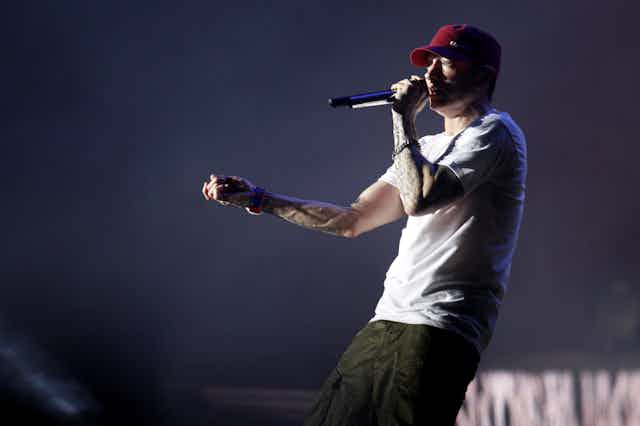As in previous years, the 2017 BET Awards asked a few artists to perform freestyle rap, or cypher in rap jargon. Although he didn’t perform on stage, Eminem sent a video titled The Storm where, for almost five minutes, he criticises Donald Trump, namely his reaction to Puerto Rico’s natural disaster and NFL African American players’ protests.
This is not at all new in the hip-hop world. In March, Snoop Dogg presented a controversial music video where he shoots a Trump lookalike clown character with a prank gun and in November he posted a promotional image for his upcoming album Make America Crip Again on Instagram, depicting himself standing beside Trump’s dead body – recreating Ice Cube’s 1991 no less controversial Death Certificate album cover.
Some African Americans, like Snoop Dogg, praised Eminem’s cypher, others claim they “don’t need a white saviour”. But perhaps more surprising was the president’s silence.
Trump, who is known for being quick and reckless when it comes to using his Twitter account to respond to anyone who criticises him, didn’t reply to Eminem’s ranting performance, which has upset the artist. And the fact that he didn’t reply this time might be significant. Trump mobilised mainly voters from a white, poor, disillusioned background – Eminem’s background. And Eminem’s “we better give Obama props” verse might just verbalise what some of those Trump voters are starting to think these days.
In fact, Eminem has been quite active against both domestic and foreign governments. In April 2017, he sued New Zealand’s National Party for using one of his songs. Determined to guarantee a third term in office, National ran the 2014 general election campaign with one clear message: they were the only political force that could steer New Zealand on a steady course towards economic prosperity.
The campaign advert shows a faultlessly synchronised rowing team paddling up a river while a strong syncopated tune entitled “Eminem-Esque” is playing in the background. National claim the track was obtained in good faith from an Australian-based production outfit. But the truth is it sounds remarkably like Eminem’s 2002 hit song Lose Yourself. In fact, it is the same song. So much so that the artist sued National for copyright infringement and won £315,000 in damages.
But the issue goes way beyond copyright infringement. When artists see one of their songs being appropriated for political purposes, they must make a choice – allow it or not. And that choice immediately becomes political. If they agree to it, they are ideologically aligned – if not, they are against.
Music has always been used to convey ideologies. Just think of any national anthem, or the Nazi appropriation of Wagner’s music as a symbol of racial purity, or the profuse touring of American big bands around the world after World War II promoting the US as a multicultural and sophisticated society. Music plays an important part in circulating political messages and it’s often used in political campaigns in order to propel specific ideals.
The 1997 New Labour campaign decided to use D:REAM’s Things Can Only Get Better – an upbeat dance track – as its official song. Labour wanted to promote itself as an inclusive, intercultural, modern and positive political force – an image very much manifest in its campaign advert. Singer-songwriter Peter Cunnah was asked by Labour if his song could be used. Not only did he agree to that, he actually sang it at rallies as part of the campaign.
Donald Trump’s 2016 campaign, on the other hand, managed this issue rather catastrophically. No permission was asked from the artists, assuming that paying for copyrights would be enough. It so happened that most of those artists demanded their songs to be removed from the campaign, simply because they didn’t want to be associated with Trump. Such was the case with Rolling Stone’s You Can’t Always Get What You Want, Adele’s Skyfall and Rolling in the Deep and REM’s It’s the End of the World As We Know It.
They do seem almost random choices. And obviously lyrics were not regarded as significant as the catchy potential of the melodies when it came to select them. However, they do convey the candidate’s main selling point – like these songs, regardless of the message, he is popular.
When Trump took the stage for the tea-party Stop the Iran Deal rally in Washington in 2015 with REM’s song, singer Michael Stipe reacted viscerally:
Go fuck yourselves, the lot of you — you sad, attention-grabbing, power-hungry little men. Do not use our music or my voice for your moronic charade of a campaign.
On its Facebook page, the band posted a clear statement.

In the absence of more palpable combativeness from high-profile figures of the Democratic Party, pop artists seem to be taking central stage on being vocal against Trump. From Madonna, John Legend and Cher, to Miley Cyrus, Shakira and Stevie Wonder, they’ve all spoken out against him. The difference with Eminem is that he uses the same level of bullying as the president. And that might just draw some of Trump voters’ attention.

